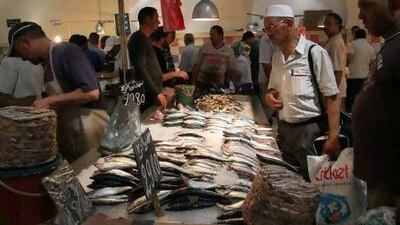TUNIS // The Central Market in Tunis is a kaleidoscope of foodstuffs, where shoppers linger over mounds of purple figs, glistening pickles and silvery fish, while stallholders call out and national flags fly.
But many of those stocking up for Ramadan dinners say food prices have increased so much that dishes they make every year have become unaffordable, after a series of shocks threatened the country's fragile economic stability.
"I am making economies on meat, eggs, fish, milk," said Bakoush Dhuha, an oil company employee shopping for her family.
"We have the traditional Ramadan foods of soups and salads, but fish is less often present on the table."
Among the countries changed irrevocably by uprisings against autocrats last year, Tunisia's economy has fared better than most, with an International Monetary Fund (IMF) report this month cautiously predicting growth.
But consumers and others say that economic pain is growing and unemployment not easing - developments that could imperil the political transition from last year's overthrow of Zine El Abidine Ben Ali.
Like others working and shopping in the market, Mrs Dhuha blamed the state of the economy on the government elected after Ben Ali's demise.
She accused the new leaders of mismanaging the economy, which has been hampered by political rows precipitating the departure of the head of the central bank and the finance minister. One government policy in particular has infuriated many citizens and some politicians: a plan by the Islamist-led government to use public money to pay compensation to people who were prisoners under Ben Ali - many of whom were jailed for involvement with political Islam.
"People are dying of hunger at this time," said Mrs Dhuha. "It's not fair. They're doing it because these are their people."
More than 11,000 have applied to receive compensation under a law passed by an interim government before last year's elections, said state media last month. Each person deemed eligible could receive as much as 50,000 Tunisian dinars (Dh113,000), according to finance ministry estimates.
Activists say they are outraged, upset that the dominant, Islamist Ennahda party is shoring up political support at the expense of people who are unemployed and short of food.
The growth of Islamism and economic problems are key political issues in Tunisia, post-Ben Ali, and as the two converged into one toxic controversy, hundreds gathered to protest at the compensation plan in the capital last month, as the political fallout began.
The proposed payout represents a "serious excess", said Houcine Dimassi, who served as finance minister until the end of last month when he abruptly stepped down
Mr Dimassi said that "promulgation of such a piece of legislation will be in total contradiction with the difficult economic and financial situation that Tunisia will be going through in the coming years".
He also highlighted the earlier dismissal of the head of the central bank, calling the departure of Mustapha Kamel Nabli "arbitrary and unfair".
Mr Nabli's departure in July after a series of disagreements with the political executive, led to Moody's Investors Service downgrading the country's credit rating.
"Mr Nabli's dismissal is credit negative for Tunisia ... it damages the central bank's credibility, a key factor in the sovereign's credit strength, and will further unsettle investors already jittery after last year's revolution," said Moody's.
Other indicators suggest that Tunisia's economic recovery is weak at best.
The important tourism industry is not yet back to normal. According to the National Institute of Statistics, unemployment fell only slightly in the first quarter of this year from 18.9 per cent to 18.1.
The IMF's public note on Tunisia on August 3, while describing a rebound, warned that the country needed huge restructuring for sustained growth.
Slim Besbes, who is, for now, in charge of the finance ministry, acknowledged that there were problems.
Food prices had been driven up, he said, by an increase in farmers smuggling their produce into neighbouring Libya and Algeria, where the prices are higher.
A committee is addressing the problem, he said, and the government is working on public works programmes to combat unemployment. Regarding the controversial payments to former political prisoners, he urged people to think ethically.
"It's not a question of how much," said Mr Besbes.
"It's the principle first, let's discuss the principle." As the law on compensation was passed before the present leaders came to power, they could hardly be blamed for enacting it, he added.
"Those who are concerned with their compensation are impatient, and there are thousands of them," he said. "No one can predict when it might explode."
Mr Besbes insisted that there was no question of political gain, merely that the payout would demonstrate functioning government.
"It shows that the party is effective in the government ... it won't be wise for any party that reached power to ignore their followers," he said.
But reports of water shortages, labour union rows and a growing wave of demonstrations, including a general strike on Tuesday in Sidi Bouzid where the uprisings began, are piling on top of the economic issues.
It is unclear whether Ennahda is convincing Tunisian voters that it is the best party to run the country. New elections for the first full, formal government are tentatively set for next year, once a new constitution has been written.
"The government are not responsible, they are not credible, they did not keep their electoral promises," said Shedly Nawaar, selling bread and jam in the market.
"I voted for Ennahda, but I wouldn't do it again."

